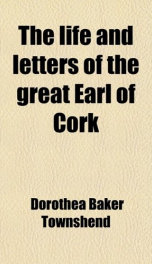the life and letters of the great earl of cork

Purchase of this book includes free trial access to www.million-books.com where you can read more than a million books for free. This is an OCR edition with typos. Excerpt from book: CHAPTER II 'PACATA HIBERNIA' 1599i60i ' Were now the general of our gracious Empress (As in good time he may) from Ireland coming Bringing rebellion broached on his sword . . .' Henry V. Act v. When Boyle landed in Kerry as Clerk to the Munster Council, he was no richer in coined money than when he fled to England at the outbreak of the rebellion. But he had arrived in England as a fugitive, a ruined landowner, and a prisoner who had broken bail; he returned to Ireland buoyed up by the hopes and ambitions of the men who were resolved to create a new Munster. The history of the way in which they pacified Ireland was told by Carew himself in his Pacata Hibernia? and although there are but two allusions to Boyle by name in that brilliant narrative, it makes us realise, as no other book but the Faery Queen can do, in what sort of times Boyle lived, what manner of men were his comrades, and under what teacher he learned the art of government. This Munster war was but a fresh outbreak of the flames that had been smouldering there since the time of the great Desmond rebellion, and now had wakened to fresh life at the call of Tyrone and Red Hugh O'Donnell from Ulster. 1 Pacata Hibcrnia was published under the name of Carew's son, Sir Thomas Stafford, but Boyle always speaks of it as Carew's book. The English had hoped that Munster was pacified, when, sixteen years before, the luckless old Earl of Desmond had been run to ground by the English in a herdsman's hut, and his silver head struck off and sent to blacken on London Bridge. His only son, young James Fitzgerald, could see it plain enough from the window of the prison in the Tower where he was kept caged from his childhood. The poor boy was the Queen's godson, and as the true representative of the great Desmon...
Info about the book
Author:
Series:
Unknown
ISBN:
1278648968
Rating:
3/5 (2)Your rating:
0/5
Languge:
English
Users who have this book
Users who want this book
What readers are saying
What do you think? Write your own comment on this book!
write a commentif you like the life and letters of the great earl of cork try:
Other books by this author
Do you want to exchange books? It’s EASY!
Get registered and find other users who want to give their favourite books to good hands!

